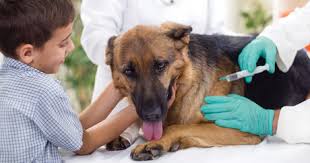Archive for June 30th, 2019
A Cancer Vaccine for Dogs? Maybe Someday Humans?
AZ Central has published an article discussing a possible cancer vaccine for dogs. If this is successful, humans could be next. Now wouldn’t that be the best medical news we’ve heard in years?

A study has launched to test whether a vaccine developed by Arizona State University scientists could actually prevent cancer in dogs.
The study began in early May, more than a decade after Stephen Johnston, an ASU scientist and professor in the School of Life Sciences, began work on the vaccine.
“About 12 years ago, I decided I wanted to invent something important in cancer,” Johnston said. “That’s when we came up with this idea of a vaccine to prevent cancer because that would be the ultimate invention.”
The initial plan was to try to vaccinate humans, but it was challenging to get people on board with the idea and to secure enough funding.
Then someone suggested Johnston test the vaccine on dogs.
“I thought, ‘Wow I should’ve thought of that earlier,'” he said.
The study, which will include more than 800 dogs, is the largest clinical trial that’s been conducted for canine cancer, according to an ASU press release. It was made possible by a $6 million grant from the Open Philanthropy Project.
How the study works
Before participating in the trial, each dog is tested to ensure they are healthy and cancer-free. More than 800 dogs, ages of 6 to 10, are randomly assigned to a control group or a placebo group.
Half of the dogs will receive the vaccine, while the other half gets the mock version. Neither the doctor administering the vaccine nor the dog’s owner will know which version the dog receives.
Each dog receives four shots over the first four weeks. After that, they will have a checkup every six months to monitor their progress.
Scientists will study whether dogs who received the vaccine have fewer tumors than those who got the placebo.
Hundreds of dogs with cancer were screened ahead of the study. Researchers used those screenings to target the vaccine toward eight major cancers found in dogs.
The anticancer vaccine, developed by Johnston and his team at ASU, targets a group of proteins found on the surface of cancer cells. By injecting these proteins with a substance that produces an immune response into healthy patients, they are “boosting the immune response before they would get the tumor,” Johnston said.
Researchers are testing the dogs at three remote participating sites: the University of Wisconsin-Madison School of Veterinary Medicine, Colorado State University and the University of California-Davis.
Two or three dogs will be vaccinated each day through the first part of the trial. The study could last up to five years, but it could also end much sooner if results are promising.
“If it looks like the vaccine is working quite well, then we won’t continue the study,” Johnston said.
‘Accessible to anyone in the world’
Johnston said his team’s work contrasts that of other cancer researchers whose vaccines might only be economically viable for wealthier countries.
Remember your pets count!
We’re in the middle of a 60s and 70s weekend. Join us for all of your Summer songs and great memories on Edgewater Gold Radio. Ask Alexa to “play Edgewater Gold Radio” or listen from our website: Edgewater Gold Radio.com.